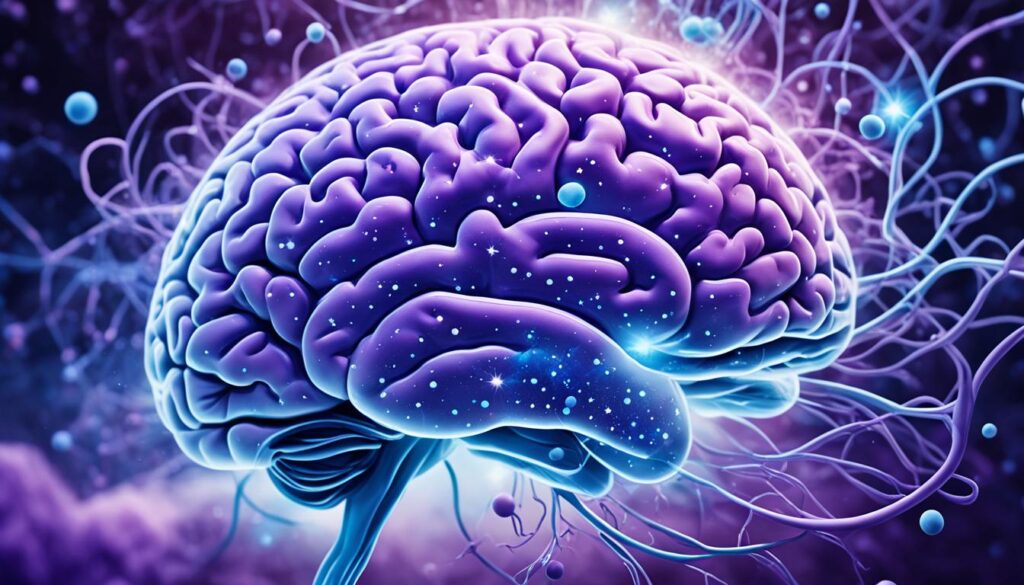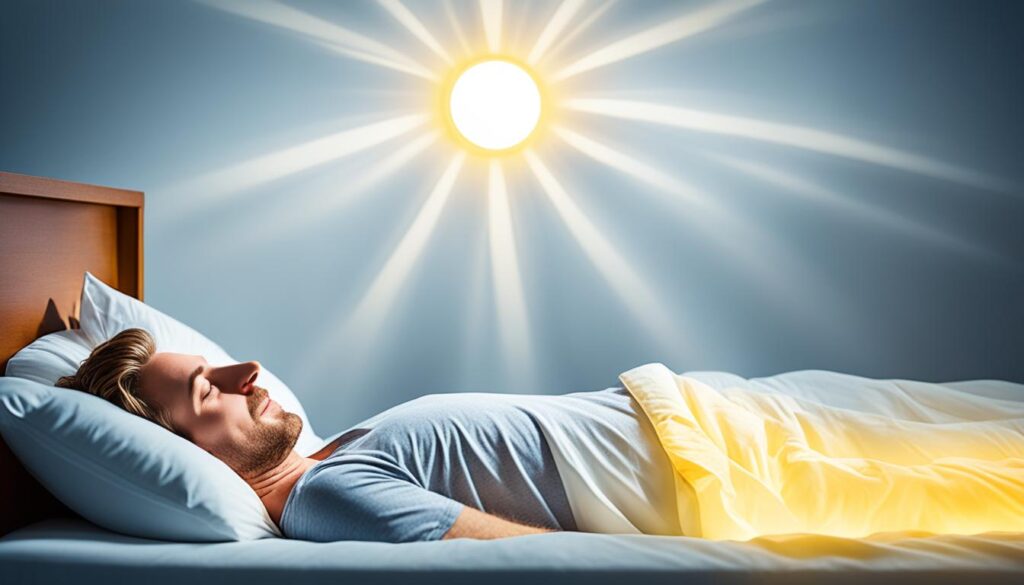Quality sleep is essential for optimal rest and overall well-being. By using sleep tracking apps, you can analyze your sleep patterns, improve your sleep quality, and wake up feeling refreshed. In this article, we will explore the best sleep tracking apps available and how they can enhance your sleep experience.
Key Takeaways:
- Sleep tracking apps can help you analyze your sleep patterns and improve your sleep quality.
- Using sleep tracking apps can lead to waking up feeling refreshed and rejuvenated.
- These apps provide valuable insights into your sleep habits and help you make necessary adjustments for better rest.
- Exploring different sleep tracking apps can help you find the one that suits your needs and preferences.
- Utilizing sleep tracking apps can contribute to overall well-being and enhance your sleep experience.
The Science of Sleep: Unveiling the Path to Better Rest
Sleep is a vital component of our overall well-being, supporting brain restoration, emotional regulation, and physical health. During sleep, our brains engage in essential processes, such as memory consolidation, learning, and problem-solving. Let’s delve into the intricate workings of sleep and explore how it can directly impact our daily lives and well-being.
Adequate sleep is crucial for brain restoration, allowing our brains to process and consolidate the information gathered throughout the day. It facilitates learning, enhances memory retention, and improves overall cognitive function. Quality sleep is also closely linked to emotional regulation, helping us effectively manage stress, regulate our emotions, and maintain stable mental health.
Furthermore, sleep plays a significant role in supporting our physical health. It is during sleep that our body repairs and rejuvenates itself, promoting physical recovery and growth. Adequate sleep is essential for energy restoration, allowing us to wake up refreshed and ready to tackle the day ahead.
To optimize our sleep, it’s important to prioritize sleep hygiene. Sleep hygiene refers to the practices and habits that contribute to a good night’s sleep. By implementing the following strategies, we can create a sleep-friendly environment and improve the quality of our sleep:
- Create a Sleep-Friendly Environment: Keep your bedroom cool, dark, and quiet. Use comfortable bedding and invest in a supportive mattress and pillow.
- Establish a Bedtime Ritual: Develop a consistent bedtime routine that helps signal to your body that it’s time to sleep. This can include activities such as reading, taking a warm bath, or practicing relaxation techniques.
- Manage Stress: Incorporate stress-management techniques into your daily routine, such as meditation, deep breathing exercises, or journaling. Find what works best for you to unwind and alleviate stress before bedtime.
- Assess Your Sleep Environment: Evaluate factors that may be disrupting your sleep, such as excessive noise, uncomfortable temperature, or an unsupportive mattress. Consider making necessary adjustments for a more conducive sleep environment.
By prioritizing sleep hygiene and making these adjustments, you can create the ideal conditions for restful and rejuvenating sleep, ultimately improving your overall well-being and daily performance.
“Sleep is the golden chain that ties health and our bodies together.” – Thomas Dekker
Strategies for Optimizing Your Sleep
To optimize your sleep and improve your overall well-being, it’s essential to prioritize sleep hygiene, cultivate a bedtime ritual, manage stress, and assess your sleep environment. By implementing these strategies, you can enhance the quality of your sleep and wake up feeling refreshed and rejuvenated.
Prioritize Sleep Hygiene
Sleep hygiene refers to the habits and practices that promote healthy sleep. Creating a sleep-friendly environment is crucial for optimal rest. Ensure your bedroom is cool, quiet, and dark. Consider using blackout curtains, earplugs, or white noise machines to minimize any disruptions that could affect your sleep quality.
Cultivate a Bedtime Ritual
Establishing a consistent bedtime routine signals to your body that it’s time to unwind and prepare for sleep. Engage in relaxing activities before bed, such as reading a book, practicing deep breathing exercises, or taking a warm bath. Avoid stimulating activities or exposure to bright screens, as these can interfere with your body’s natural sleep-wake cycle.
Manage Stress
Stress can have a significant impact on the quality of your sleep. Incorporate stress management techniques into your daily routine, such as meditation, yoga, or journaling. Find healthy ways to unwind and relax, allowing your mind and body to enter a calm state conducive to restful sleep.
Assess Your Sleep Environment
Your sleep environment plays a crucial role in promoting optimal sleep. Evaluate factors like mattress comfort, pillow support, and room temperature to ensure they are conducive to quality rest. Consider investing in a comfortable mattress and pillow that suit your sleep preferences and address any issues that may hinder your sleep, such as allergies or discomfort.
Remember, optimizing your sleep requires a holistic approach. By prioritizing sleep hygiene, cultivating a bedtime ritual, managing stress, and assessing your sleep environment, you can create the ideal conditions for experiencing restorative sleep and improving your overall well-being.
| Strategies for Optimizing Your Sleep | Benefits |
|---|---|
| Prioritize sleep hygiene | Promotes a sleep-friendly environment |
| Cultivate a bedtime ritual | Signals to your body that it’s time to sleep |
| Manage stress | Reduces stress levels for better sleep quality |
| Assess your sleep environment | Ensures optimal comfort and conditions for sleep |
Implementing these strategies can lead to improved sleep quality and overall well-being. By making sleep a priority and taking proactive steps to optimize your sleep, you can enjoy the numerous benefits of restful and rejuvenating nights.

Concrete Actions for Enhanced Sleep and Entrepreneurial Performance
To enhance your sleep and entrepreneurial performance, it is important to establish a consistent sleep schedule, track your sleep patterns using sleep-tracking apps, implement wind-down activities before bed, and seek professional help if you consistently struggle with sleep issues. These concrete actions can optimize your sleep and support your success as an entrepreneur.
Establish a Sleep Schedule
One of the key steps in improving your sleep is establishing a consistent sleep schedule. Aim to go to bed and wake up at the same time every day, even on weekends. This helps regulate your body’s internal clock and promotes better sleep quality over time.
Track Your Sleep Patterns
Utilize sleep-tracking apps to monitor and analyze your sleep patterns. These apps can provide valuable insights into your sleep duration, sleep stages, and efficiency. By tracking your sleep patterns, you can identify any disruptions or areas for improvement and make informed adjustments to optimize your rest.
Implement Wind-Down Activities
Wind-down activities before bed are essential for preparing your body and mind for sleep. Engage in relaxing activities such as reading a book, practicing mindfulness or meditation, taking a warm bath, or listening to soothing music. These activities help signal to your body that it’s time to unwind and prepare for a restful night’s sleep.
Seek Professional Help
If you consistently struggle with sleep issues such as insomnia, sleep apnea, or other sleep disorders, it is important to seek professional help. Consult a sleep specialist or healthcare provider who can diagnose and provide appropriate treatment options to address your specific sleep concerns. Professional guidance can significantly improve your sleep quality and overall well-being.
By establishing a sleep schedule, tracking your sleep patterns, implementing wind-down activities, and seeking professional help when needed, you can take concrete actions to enhance your sleep and optimize your performance as an entrepreneur.
Sleep Cycles and the Role of REM Sleep
Sleep is composed of different stages, each with its own unique characteristics and functions. Two main stages are NREM sleep and REM sleep, which play vital roles in sleep quality and overall well-being. Understanding these sleep stages and their significance can help optimize your sleep and promote a healthier lifestyle.
NREM Sleep
NREM sleep, short for non-rapid eye movement sleep, is divided into three stages: N1, N2, and N3. During N1, the transitional stage from wakefulness to sleep, you may experience light sleep, muscle twitches, and brief dream-like images. N2 is a deeper stage of sleep where your brain waves slow down, body temperature drops, and heart rate stabilizes. N3, also known as deep or slow-wave sleep, is the stage where the body undergoes physical restoration and growth, and the brain performs memory consolidation for information acquired during wakefulness.
“NREM sleep plays a crucial role in physical rejuvenation and memory consolidation.”
This stage is essential for repairing and healing tissues, boosting the immune system, and replenishing energy levels. It contributes to learning and memory by reinforcing newly acquired information and strengthening neural connections. NREM sleep is crucial for the body’s physical recovery and contributes to overall well-being.
REM Sleep
REM sleep, also known as rapid eye movement sleep, is the stage associated with dreaming and plays a critical role in emotional regulation and memory consolidation. During REM sleep, brain activity increases, resembling wakefulness, while the body remains in a state of muscle paralysis. This stage occurs approximately 90 minutes after falling asleep and recurs several times throughout the night.
“REM sleep is essential for memory consolidation and emotional regulation.”
REM sleep is crucial for memory processing and consolidation, helping you retain and integrate information learned during the day. It allows the brain to connect new experiences with existing knowledge and form long-term memories. Additionally, REM sleep is involved in emotional regulation and processing complex emotions, enhancing your psychological well-being.
The Intricacies of Sleep Cycles – from NREM to REM
Sleep cycles are composed of two main stages: non-rapid eye movement (NREM) and rapid eye movement (REM) sleep. These stages play a vital role in providing restorative sleep and are essential for our overall well-being.
NREM Sleep:
“NREM stage 1” marks the transition from wakefulness to sleep. During this stage, brain activity slows down, and we may experience drifting thoughts or sudden muscle contractions known as hypnic jerks. It is relatively easy to wake up from this stage.
“NREM stage 2” is a deeper sleep stage. Our body temperature and heart rate decrease, and our brain waves become slower. This stage makes up a significant portion of our sleep cycle and helps to restore energy and promote memory consolidation.
“NREM stage 3”, also known as deep, slow-wave sleep, is the most restorative stage. It is when our brain waves are at their slowest, and our body repairs and regenerates tissues, strengthens the immune system, and releases growth hormones. Waking up from this stage may lead to grogginess and disorientation.
REM Sleep:
REM sleep, or rapid eye movement sleep, is characterized by the frenetic movement of our eyes beneath our eyelids. It is during this stage that we experience most of our dreams. While our body becomes immobilized, our brain activity increases, resembling that of being awake. REM sleep is crucial for cognitive functioning and emotional regulation, allowing us to process and consolidate memories and regulate our emotions.

All these stages work together in a cyclical pattern throughout the night, allowing us to experience the restorative benefits of sleep. It is important to prioritize each stage of the sleep cycle to maintain overall sleep health and wake up feeling refreshed.
| Sleep Stage | Description |
|---|---|
| NREM stage 1 | Transition from wakefulness to sleep. Brain activity slows down, and hypnic jerks or drifting thoughts may occur. |
| NREM stage 2 | Deeper sleep stage characterized by slower brain waves. Body temperature and heart rate decrease. |
| NREM stage 3 | Deep, slow-wave sleep that is highly restorative. Brain waves are slow, and essential bodily functions occur. |
| REM sleep | Rapid eye movement sleep where most dreaming occurs. Increased brain activity and cognitive processing. |
REM Sleep and Its Crucial Role
REM sleep, or rapid eye movement sleep, plays a vital role in emotional regulation and memory consolidation. It is during this phase of sleep that the brain processes emotional experiences and forms new memories. The significance of REM sleep extends beyond its role in emotional and cognitive processes.
Inadequate REM sleep can have detrimental effects on our mental well-being. Research suggests that insufficient REM sleep can impair cognitive functions, including memory and decision-making. Without an adequate amount of REM sleep, our ability to process and regulate emotions may be compromised.
Understanding the importance of REM sleep can help us prioritize strategies that enhance its quality and duration. By optimizing REM sleep, we can support our overall mental health and well-being.
Table: Benefits of REM Sleep
| Emotional Regulation | Memory Consolidation |
|---|---|
| During REM sleep, the brain processes emotional experiences, helping regulate emotions in daily life. | REM sleep plays a crucial role in consolidating new memories and integrating them into long-term storage. |
| Insufficient REM sleep can lead to heightened emotional reactivity and difficulties in emotional regulation. | Lack of REM sleep can impair memory formation and retrieval, impacting learning and decision-making. |
| Inadequate REM sleep is associated with mood disorders, such as depression and anxiety. | Optimizing REM sleep can enhance memory recall, problem-solving abilities, and creativity. |
By prioritizing strategies that improve REM sleep, such as maintaining a consistent sleep schedule, creating a sleep-friendly environment, and managing stress levels, we can enhance our emotional well-being and cognitive function.

How To Enhance REM Sleep Quality and Duration
REM sleep, also known as rapid eye movement sleep, is a crucial stage of sleep that plays a significant role in memory consolidation and emotional regulation. To optimize REM sleep quality and duration, there are several key actions you can take:
Maintain a Consistent Sleep Schedule
Establishing a regular sleep-wake cycle is essential for promoting healthy REM sleep. Try to go to bed and wake up at the same time every day, even on weekends. Consistency helps regulate your body’s internal clock and can improve the overall quality of your sleep.
Limit Alcohol and Caffeine Intake
Alcohol and caffeine can disrupt the normal sleep pattern, including REM sleep. While alcohol may initially make you feel drowsy, it can lead to fragmented sleep and reduced REM sleep later in the night. Similarly, caffeine is a stimulant that can interfere with falling asleep and decrease overall sleep quality. Limit your consumption of these substances, especially in the evening, to optimize REM sleep.
Create a Sleep-Friendly Environment
A comfortable and serene sleep environment can greatly enhance REM sleep. Make sure your bedroom is cool, dark, and quiet, as these factors promote deep and restorative sleep. Consider investing in a supportive mattress, cozy bedding, and noise-blocking curtains or earplugs to create an ideal sleep sanctuary.
Consider Melatonin and Its Significance
Melatonin is a hormone that helps regulate the sleep-wake cycle. It is naturally produced by the body in response to darkness, signaling the onset of sleep. Some individuals may benefit from melatonin supplements to aid in falling asleep and improving REM sleep. However, it’s important to consult with a healthcare professional before starting any new supplement regimen.
Also Read:- Top 5 Best Language Translation Apps Of 2024
By incorporating these strategies into your daily routine, you can enhance the quality and duration of REM sleep, leading to more restful nights and improved overall sleep health.

The Circadian Rhythm: Understanding Your Body’s Natural Sleep-Wake Cycle
The circadian rhythm, also known as the body’s internal clock, is responsible for regulating your sleep-wake cycle. It is a natural, 24-hour cycle that determines when you feel alert and awake and when you feel tired and ready for sleep. The circadian rhythm is influenced by various factors, with light exposure being a crucial one.

Light exposure plays a significant role in regulating the circadian rhythm. Exposure to natural light during the day helps synchronize your internal clock, promoting wakefulness and alertness. On the other hand, excessive artificial light at night, especially from electronic devices, can disrupt your circadian rhythm and make it harder for you to fall asleep.
“Light exposure has a direct impact on our sleep-wake cycle. By understanding the role of light and how it affects our circadian rhythm, we can take steps to optimize our sleep.”
Disruptions in the circadian rhythm can lead to sleep problems, including difficulty falling asleep or staying asleep. If you regularly experience sleep problems, it may be essential to evaluate your light exposure throughout the day and enhance your sleep environment to promote a healthy circadian rhythm.
Strategies to Optimize Your Circadian Rhythm:
- Expose yourself to natural light during the day, especially in the morning.
- Avoid bright screens, such as phones and tablets, in the evening hours.
- Create a soothing and dark sleep environment to promote melatonin production.
- Establish a consistent sleep schedule, ensuring regular bedtimes and wake-up times.
By understanding your body’s natural sleep-wake cycle, you can align your lifestyle and habits to support a healthy circadian rhythm, leading to better sleep and overall well-being.
Sleep Hygiene Checklist: Daily Habits to Optimize Your Sleep
To improve your sleep quality and overall well-being, it is essential to establish good sleep hygiene. By implementing these daily habits, you can optimize your sleep and wake up feeling refreshed.
1. Follow a Consistent Sleep Schedule
Setting a consistent sleep schedule helps regulate your body’s internal clock and promotes better sleep. Try to go to bed and wake up at the same time every day, even on weekends. This routine helps synchronize your sleep-wake cycle and improves your sleep quality.
2. Engage in Physical Activity
Regular physical activity has been shown to improve sleep quality. Engaging in exercise during the day can help promote deeper and more restful sleep at night. Aim for at least 30 minutes of moderate-intensity exercise most days of the week.
3. Create a Quiet and Dark Bedroom
A calming sleep environment is crucial for optimal rest. Create a quiet and dark bedroom by using earplugs or white noise machines to block out noise and using room-darkening curtains or a sleep mask to eliminate light disturbances. Ensure your bedroom is a tranquil space that promotes relaxation and sleep.
4. Establish a Consistent Bedtime Routine
Having a consistent bedtime routine signals to your body that it’s time to wind down and prepare for sleep. This routine can include activities such as reading a book, practicing relaxation techniques, or taking a warm bath. Find a routine that works for you and stick to it every night.
| Habits to Optimize Your Sleep | Description |
|---|---|
| Follow a Consistent Sleep Schedule | This habit involves going to bed and waking up at the same time every day to regulate your sleep-wake cycle. |
| Engage in Physical Activity | This habit includes incorporating regular exercise into your daily routine, which can improve sleep quality. |
| Create a Quiet and Dark Bedroom | This habit focuses on creating a sleep-friendly environment by reducing noise and light disturbances in your bedroom. |
| Establish a Consistent Bedtime Routine | This habit involves establishing a routine of relaxing activities before bed to signal to your body that it’s time to sleep. |
By following these daily habits, you can optimize your sleep and improve your overall sleep quality. Incorporate them into your lifestyle to reap the benefits of a good night’s rest.
Conclusion
Sleep tracking apps provide a valuable tool for optimizing sleep quality and improving sleep habits. By utilizing these apps, individuals can gain insights into their sleep patterns and make adjustments to their sleep routine to enhance their overall well-being. Applying the strategies and actions discussed in this article can help unlock the secrets of sleep and achieve optimal rest.
By incorporating sleep tracking apps into daily life, users can monitor their sleep patterns and identify areas for improvement. These apps offer valuable data and analysis, allowing individuals to understand their sleep cycles, duration, and quality. With this information, users can make targeted changes to optimize sleep quality and promote healthier sleep habits.
In addition to using sleep tracking apps, it is important to prioritize sleep hygiene and implement strategies for better sleep. This includes maintaining a consistent sleep schedule, creating a sleep-friendly environment, practicing relaxation techniques, and managing stress levels. By combining these efforts with the insights provided by sleep tracking apps, individuals can develop effective sleep habits and wake up feeling refreshed and rejuvenated.
Remember, quality sleep is essential for overall well-being. By utilizing sleep tracking apps, optimizing sleep quality, and improving sleep habits, individuals can unlock the potential of a restful night’s sleep and experience the numerous benefits it brings.
FAQs
Q: What is a sleep tracker app?
A: A sleep tracker app is a smartphone application designed to monitor and analyze your sleep patterns and provide insights to help you improve your quality of rest.
Q: How can a sleep app help me sleep better?
A: A sleep app can help you sleep better by tracking your sleep patterns, providing personalized sleep tips, and helping you understand and improve your sleep habits.
Q: What are the best sleep apps of 2024?
A: The best sleep apps of 2024 include those with features such as advanced sleep analysis, personal sleep cycle monitoring, and integration with other health and wellness apps.
Q: What is the importance of using a sleep-tracking app?
A: Using a sleep-tracking app can help you understand your sleep patterns, identify areas for improvement, and ultimately lead to better overall sleep quality and health.
Q: Can a sleep app also function as an alarm clock?
A: Yes, many sleep apps also include alarm clock features, allowing users to wake up gently at an optimal point in their sleep cycle.
Q: Is there a sleep app endorsed by the American Academy of Sleep Medicine?
A: Yes, there are sleep apps endorsed by the American Academy of Sleep Medicine, which have been evaluated for their accuracy and effectiveness in tracking and analyzing sleep.
Q: How do sleep apps measure sleep?
A: Sleep apps measure sleep using a combination of data from your smartphone’s sensors, such as movement and sound, as well as user input about sleep quality and duration.
Q: What features should I look for in a sleep app?
A: When choosing a sleep app, look for features such as sleep tracking, personalized insights, integration with other health apps, and options for monitoring and improving your sleep habits.
Source Links
- https://www.linkedin.com/pulse/science-sleep-unlocking-secrets-better-rest-enhanced-amélie-mazoyer?utm_source=rss&utm_campaign=articles_sitemaps
- https://equilondon.com/blogs/equilife/unlocking-the-secrets-of-sleep
- https://www.biospherenutrition.co.nz/blogs/sleep/unlock-the-secrets-of-slumber-a-comprehensive-guide-to-healthy-sleep-habits